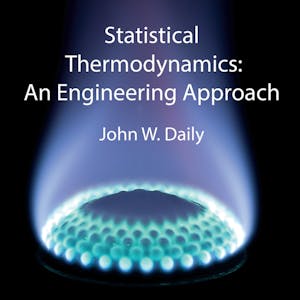This specialized course delves into the fundamental principles of Statistical Thermodynamics, catering to advanced undergraduate and graduate students in mechanical or aerospace engineering. It equips learners with the knowledge to bridge the gap between macroscopic and microscopic thermodynamics, exploring the behavior of ideal gases, dense gases, liquids, and solids.
Through a postulatory approach, students will gain a deep understanding of temperature, thermodynamic pressure, and chemical potential, while also delving into quantum mechanics and its impact on atomic and molecular structural behavior. The course also covers the analysis of non-equilibrium phenomena, incorporating computational skills to estimate material behavior.
Certificate Available ✔
Get Started / More Info
Statistical Thermodynamics modules cover fundamental concepts, quantum mechanics, ideal gases, dense gases/liquids/solids, and non-equilibrium applications. Gain insights into macroscopic and microscopic thermodynamics and computational skills.
Explore the concept of temperature, thermodynamic pressure, and chemical potential from a postulatory perspective, elucidating the Fundamental Relation’s role in establishing connections between atomic/molecular structure and macroscopic properties.
Delve into the relationship between the Schrödinger wave equation and atomic/molecular structural behavior, and understand modern quantum chemistry numerical solution methods for solving the wave equation. Analyze the role of quantum mechanics in explaining atomic and molecular structural behavior.
Analyze the behavior of monatomic, diatomic, and polyatomic ideal gases under various conditions, distinguishing between pure ideal gases and ideal gas mixtures, and identifying the key components of partition functions used to describe translational, rotational, vibrational, and electronic motion.
Analyze the impact of intermolecular forces on the transition of gases to liquids as density increases, evaluate the stability of a thermodynamic system as it transitions from gas to liquid state, and assess the role of the radial distribution function (RDF) in determining thermodynamic properties of liquids. Describe the behavior of crystalline solids using simple statistical thermodynamics.
Recognize the role of spectroscopic methods in determining the thermodynamic state of a system, utilize the Boltzmann Equation and the Chapman-Enskog solution to determine transport properties in dense gases and liquids, and analyze the impact of reaction rates and rate constants on fluid/thermal applications such as combustion.
This specialization provides an introduction to additive manufacturing (AM) with exposure to six different AM processes, covering build preparation, machine setup,...
Fabrication additive: l'impression 3D dans l'industrie offers comprehensive insights into additive manufacturing technologies and their industrial applications.
Material Jetting and Stereolithography is a comprehensive course covering two photopolymer resin-based processes. Students will gain insights into build preparation,...
Robotics: Mobility explores the design of robot bodies and behaviors for navigating unstructured environments using motors and sensors. Students will learn about...